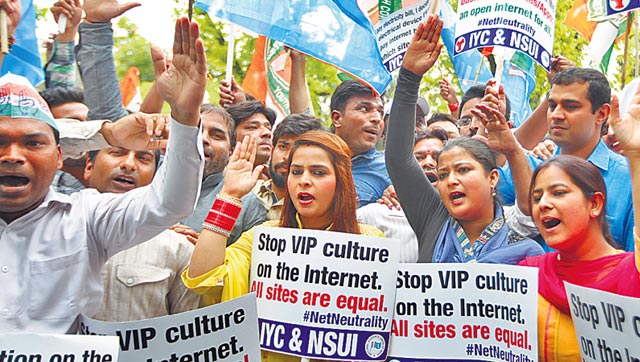The Internet is now so closely woven into our daily lives that we sometimes miss out on its deep and widespread economic impact. A BCG and IAMAI combined study estimates that Internet users in India have increased exponentially — from 7 million in 2001 to 190 million as of June 2014, and poised to touch half a billion by 2018.
Already, the Internet contributes $60 billion or 2.7% to our GDP, more than sectors such as healthcare and defence, which contribute about 2.5% each. This general and sectoral leveraging of economies by information technology (IT) is a global trend, and even more marked in mature economies.
A 2009 World Bank study noted that every 10% increase in broadband penetration raises a country’s GDP by over 1.3%. The importance of the Internet is beyond debate but we need to figure out how to leverage its untapped potential for our country’s growth.
Contrary to circulating myths about effects of a networked economy on labour markets, the Internet added 2.4 jobs for every one job it disrupts.
The UPA government firmly believed in the transformational role of the Internet.
The National Telecom Policy 2012 laid down the roadmap, projecting 600 million broadband connections by the year 2020 at minimum 2 Mbps download speed and making available higher speeds of at least 100 Mbps on demand.
Mobile-first Internet growth is racing us to these numbers. With increasing ubiquity have come challenges such as equality of access, last-mile connectivity, and affordable broadband — a broad concern that has come to be called ‘Digital Inclusion’.
Net neutrality has raised a storm precisely because the Internet’s importance, its growing numbers and broadband speeds only tell half the story. The other half of the story — about freedom and liberties — is equally crucial, even if not so easily captured in numbers.
Already, our IT and IT-enabled companies contribute to impressive growth in the services sector.
Our tech entrepreneurs have founded e-commerce entities such as Flipkart and Snapdeal that are multinational in ambition and offerings.
Segments other than e-tailing, such as e-travel, are growing at unprecedented rates. They also attract talent that usually heads to Silicon Valley and Shanghai, soundly answering criticism that India competes solely on cost. Powered by these rapidly scaling companies, India’s e-commerce market will reach $60-70 billion by 2019.
All told, e-commerce in India will deliver a whopping compound annual growth rate of 50-55% in goods and 20-24% in services between 2014 and 2019.
According to PricewaterhouseCoopers, 75% of India’s Internet users are below 35 years of age, matching the national demographic profile.
As Internet penetration grows, e-commerce and other businesses will, too. Sensing this potential, billions of dollars of private equity are pouring into these ventures.
Such growth has been possible due to non-discriminatory access to the Internet.
The fact that the Internet is the modern equivalent of the medieval town square where people can gather for chats, debate, discussion and commerce has ensured its success.
To my mind the Internet is a great ‘leveller’ — it breaks barriers of race, religion, colour, language and ethnicity that couldn’t be torn down in many a millennium.
However, users must be free to walk into this ‘town square’ and out of it as they please.
Net neutrality ensures competition by lowering the barriers to entry; it’s also crucial for ease of setting up and conducting IT-based and IT-enabled businesses, and offers choice to consumers.
As an example, the cost of running a basic Internet application has fallen from $150,000 a month in 2000 to $1,500 a month in 2011, and continues to fall, making entry easy.
A tiered pricing system of the kind being advocated by certain sections of the IT industry runs counter to these principles.
This should underline the importance of a free and fair Internet. But we are drowning in provincial arguments, guided by the logic that market forces are always sacrosanct and a majoritarian agenda that is not compatible with the present freedoms of netizens.
The Telecom Regulatory Authority of India (TRAI) and the government need to move in the reverse direction, that is, towards implementing a framework that guarantees Internet neutrality.
The government must not leave a regulatory vacuum and should specifically provide for Internet neutrality. Apart from moral and ethical considerations, there are other compelling reasons in favour of a neutral Net.
Any discriminatory access by Indian telecom companies would rightly be interpreted as protectionism, and some of the Indian IT-enabled companies might find themselves discriminated against as they go global.
There are also valid arguments, relying upon established precedents dating back to the early days of telephony, to treat the Internet as a ‘common carrier’.
To those who try to invoke market forces to automatically correct any distortions that arise, we need only say that markets are imperfect, and regulatory presence is required to prevent abuses.
While Internet service providers (ISPs) and telecom companies may be competing actors, their operations and interests are too intertwined to entirely rule out collusion at the expense of the consumers.
I wish to conclude this piece by pointing out that the threat of regulatory capture is one of the many facing the Internet.
A digital great game is afoot globally, largely out of public view, for governance of the Internet.
While India bats for a transparent Internet governance model internationally and champions the cause of multi stakeholders of this valuable resource, we must also walk the talk when it comes to having a level playing field in our own cyberspace.
For the next Google or Alibaba to come out of India we have to unflinchingly foster the spirit of the innovation and entrepreneurship; and that cannot be done on an Internet that is discriminatory. The government needs to provide leadership on this issue to enable the people’s desire for a neutral Internet to become a reality.

